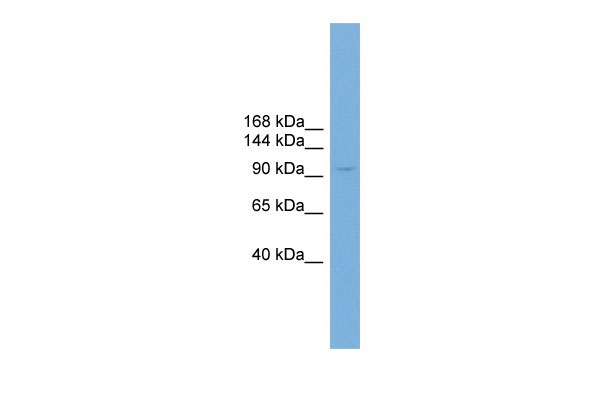PIWIL4 antibody - N-terminal region
Rabbit Polyclonal Antibody
- 产品详情
- 实验流程
Application
| WB |
|---|---|
| Primary Accession | Q7Z3Z4 |
| Other Accession | NM_152431, NP_689644 |
| Reactivity | Human |
| Predicted | Human |
| Host | Rabbit |
| Clonality | Polyclonal |
| Calculated MW | 96589 Da |
| Gene ID | 143689 |
|---|---|
| Alias Symbol | DKFZp686P01248, FLJ36156, HIWI2, MIWI2 |
| Other Names | Piwi-like protein 4, PIWIL4, HIWI2, PIWI |
| Format | Liquid. Purified antibody supplied in 1x PBS buffer with 0.09% (w/v) sodium azide and 2% sucrose. |
| Reconstitution & Storage | Add 50 ul of distilled water. Final anti-PIWIL4 antibody concentration is 1 mg/ml in PBS buffer with 2% sucrose. For longer periods of storage, store at 20°C. Avoid repeat freeze-thaw cycles. |
| Precautions | PIWIL4 antibody - N-terminal region is for research use only and not for use in diagnostic or therapeutic procedures. |
| Name | PIWIL4 |
|---|---|
| Synonyms | HIWI2, PIWI |
| Function | Plays a central role during spermatogenesis by repressing transposable elements and preventing their mobilization, which is essential for the germline integrity (By similarity). Acts via the piRNA metabolic process, which mediates the repression of transposable elements during meiosis by forming complexes composed of piRNAs and Piwi proteins (By similarity). The PIWIL4-piRNA pathway acts in the nucleus and mediates silencing of active transposons: engages with nascent transposable element transcripts and governs the piRNA-directed DNA methylation and subsequent repression of transposons (By similarity). In contrast to PIWIL1 and PIWIL2, does not show endonuclease activity (By similarity). Directly binds piRNAs, a class of 24 to 30 nucleotide RNAs that are generated by a Dicer-independent mechanism and are primarily derived from transposons and other repeated sequence elements (By similarity). Associates with secondary piRNAs antisense and PIWIL2/MILI is required for such association (By similarity). The piRNA process acts upstream of known mediators of DNA methylation (By similarity). Plays a key role in the piRNA amplification loop, also named ping-pong amplification cycle, by acting as a 'slicer-incompetent' component that loads cleaved piRNAs from the 'slicer-competent' component PIWIL2 and target them on genomic transposon loci in the nucleus (By similarity). May be involved in the chromatin-modifying pathway by inducing 'Lys-9' methylation of histone H3 at some loci (PubMed:17544373). In addition to its role in germline, PIWIL4 also plays a role in the regulation of somatic cells activities (By similarity). Plays a role in pancreatic beta cell function and insulin secretion (By similarity). Involved in maintaining cell morphology and functional integrity of retinal epithelial through Akt/GSK3alpha/beta signaling pathway (PubMed:28025795). When overexpressed, acts as an oncogene by inhibition of apoptosis and promotion of cells proliferation in tumors (PubMed:22483988). |
| Cellular Location | Nucleus. Cytoplasm Note=Probable component of the meiotic nuage, also named P granule, a germ-cell-specific organelle required to repress transposon activity during meiosis. PIWIL2/MILI is required for nuclear localization (By similarity). {ECO:0000250|UniProtKB:Q8CGT6} |
| Tissue Location | Ubiquitously expressed (PubMed:17544373, PubMed:22483988, PubMed:25038252, PubMed:28025795, PubMed:28711973) Detected in retina, retinal pigment epithelia cells (RPE) (at protein level) (PubMed:28025795). |
Research Areas
For Research Use Only. Not For Use In Diagnostic Procedures.
Application Protocols
Provided below are standard protocols that you may find useful for product applications.
REFERENCES
Sasaki T.,et al.Genomics 82:323-330(2003).
Ota T.,et al.Nat. Genet. 36:40-45(2004).
Bechtel S.,et al.BMC Genomics 8:399-399(2007).
Sugimoto K.,et al.Biochem. Biophys. Res. Commun. 359:497-502(2007).
终于等到您。ABCEPTA(百远生物)抗体产品。
点击下方“我要评价 ”按钮提交您的反馈信息,您的反馈和评价是我们最宝贵的财富之一,
我们将在1-3个工作日内处理您的反馈信息。
如有疑问,联系:0512-88856768 tech-china@abcepta.com.























 癌症的基本特征包括细胞增殖、血管生成、迁移、凋亡逃避机制和细胞永生等。找到癌症发生过程中这些通路的关键标记物和对应的抗体用于检测至关重要。
癌症的基本特征包括细胞增殖、血管生成、迁移、凋亡逃避机制和细胞永生等。找到癌症发生过程中这些通路的关键标记物和对应的抗体用于检测至关重要。 为您推荐一个泛素化位点预测神器——泛素化分析工具,可以为您的蛋白的泛素化位点作出预测和评分。
为您推荐一个泛素化位点预测神器——泛素化分析工具,可以为您的蛋白的泛素化位点作出预测和评分。 细胞自噬受体图形绘图工具为你的蛋白的细胞受体结合位点作出预测和评分,识别结合到自噬通路中的蛋白是非常重要的,便于让我们理解自噬在正常生理、病理过程中的作用,如发育、细胞分化、神经退化性疾病、压力条件下、感染和癌症。
细胞自噬受体图形绘图工具为你的蛋白的细胞受体结合位点作出预测和评分,识别结合到自噬通路中的蛋白是非常重要的,便于让我们理解自噬在正常生理、病理过程中的作用,如发育、细胞分化、神经退化性疾病、压力条件下、感染和癌症。






